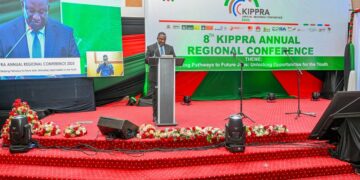The Kenyan government has unveiled a KSh995 billion plan to overhaul the country’s water and sanitation systems using smart technologies and private sector partnerships. The ambitious initiative, announced ahead of the Kenya Water and Sanitation International Conference and Exhibition in Mombasa this June, is aimed at addressing long-standing infrastructure challenges, closing service delivery gaps, and accelerating the path toward universal access by 2030. Officials say the investment will be a cornerstone in strengthening Kenya’s food security, climate resilience, and economic growth.
Cabinet Secretary for Water, Sanitation and Irrigation, Eric Muuga, has articulated a clear and ambitious vision: to achieve universal access to water and sanitation by 2030. This vision is supported by the launch of the National Water and Sanitation Investment and Financing Plan (NAWASIP), a KSh995 billion initiative that underscores the state’s determination to overhaul water infrastructure while creating a more transparent and investment-ready sector. As the country prepares to host the Kenya Water and Sanitation International Conference and Exhibition from June 23 to 27 in Mombasa, the momentum for sectoral transformation is palpable.
The government is prioritizing technology adoption not as a trend but as a necessity. Tools such as smart metering, digital billing, and Internet of Things (IoT) devices are already generating efficiency gains. According to Water Secretary Eng. SAO Alima, technologies like AI-driven predictive maintenance and digital leak detection have led to tangible reductions in non-revenue water, enhancing service reliability while conserving scarce resources. These early gains not only reflect operational improvements but also signal a new era where water management is proactive, data-informed, and user-centric.
At the policy level, the shift toward digital governance is equally transformative. The rollout of electronic procurement systems and tighter contract oversight protocols will help eliminate waste and corruption, two long-standing barriers to sectoral efficiency. These measures are designed to attract local and international investment by creating a transparent, rules-based environment where projects are financially viable and administratively sound.
Financing is a critical pillar of Kenya’s water reforms. NAWASIP recognizes that achieving universal access cannot rely solely on public funds. The government is fostering innovative financing models that blend public-private partnerships (PPPs), green bonds, and climate financing. By encouraging county governments to prepare bankable, investment-ready projects, Kenya is building a pipeline of initiatives that can attract global capital and development financing. This decentralized approach ensures that local water needs are addressed while aligning with national priorities.
The implications for Kenya’s economy and food security are profound. Reliable and efficiently managed water systems underpin agricultural productivity, urban development, and public health. In a country where agriculture accounts for over 30 percent of GDP and employs the majority of the rural population, better water infrastructure directly enhances food production and rural incomes. Moreover, the improved sanitation coverage will reduce the incidence of waterborne diseases, lowering healthcare costs and improving labor productivity.
The timing of these reforms is also critical. As climate change accelerates the frequency of droughts and floods, the need for resilient infrastructure becomes even more urgent. WASPA Chair Thomas Odongo rightly pointed out that without a fundamental rethink of financing, technology, and inclusivity, the country risks backsliding on hard-won progress toward Sustainable Development Goal 6. The reforms under way are not merely about meeting targets; they are about future-proofing the nation’s development against environmental shocks.
The upcoming conference in Mombasa is more than a ceremonial gathering. It is a catalytic platform designed to align stakeholders around a common agenda. With the participation of policymakers, county governments, researchers, development partners, private sector leaders, and community organizations, the event promises to spark new partnerships and inspire actionable commitments. The Technology Expo will showcase cutting-edge solutions such as IoT systems and nature-based infrastructure, while the Innovative Financing Lab will explore ways to unlock new capital streams. A dedicated youth forum and a professional skills competition are also on the agenda, reflecting the government’s holistic approach to sectoral capacity-building.
Beyond its technical achievements, the government’s reform strategy embodies a deeper commitment to equity. By increasing access to safely managed water and sanitation services — currently at only 73 percent and 31 percent respectively — the state is working to close historical gaps that have disproportionately affected marginalized communities. This inclusivity is not just socially just but economically smart, as equitable access to water supports broader participation in the economy and enhances national cohesion.
In sum, Kenya’s strategic focus on smart technologies, transparent governance, and innovative financing is not only reshaping the water sector but also laying the foundation for sustained economic growth and food security. These reforms, if sustained and scaled, will yield short-term benefits in service efficiency and investment attraction, while securing long-term resilience against climate change and demographic pressures. At a time when many countries are grappling with similar challenges, Kenya’s model offers a forward-looking blueprint grounded in pragmatism, innovation, and inclusivity.
Kenya’s floriculture industry is set to bloom even brighter in 2025 as flower exports are projected to surge to 110 billion Kenyan shillings, equivalent to approximately 851 million...
Read moreDetails









